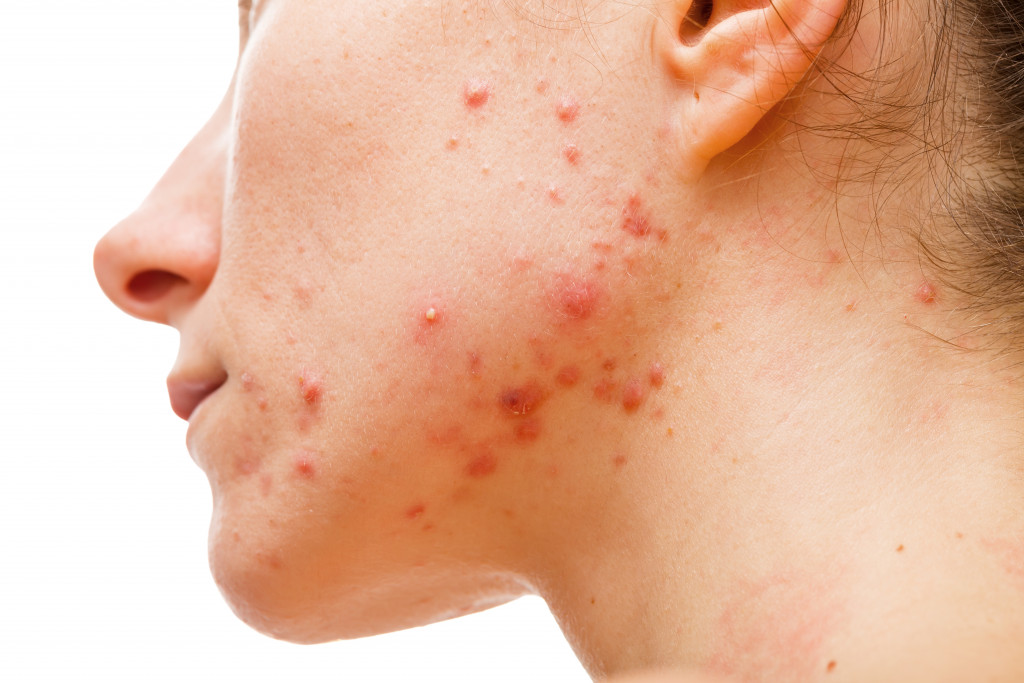- Wash your face twice daily with a gentle cleanser and moisturize if needed to keep your skin healthy.
- Apply an over-the-counter acne medication after cleansing, like benzoyl peroxide or salicylic acid.
- Consider using natural remedies to reduce inflammation and irritation, like tea tree oil, honey masks, and aloe vera gel.
- Avoid touching your face throughout the day; this can transfer bacteria onto vulnerable areas prone to breakouts.
Having acne can be a difficult and embarrassing experience. It can cause you to feel self-conscious and affect your confidence, but the good news is that you can take steps to reduce or even eliminate it.
From over-the-counter treatments to natural remedies, understanding what causes acne and how best to treat it will help ensure you get clear skin in no time. This article will provide an overview of the different types of acne, their potential causes, and tips for how to get rid of it.
Have a skincare routine.
Here are some skincare routine tips to help you keep your skin healthy:
Wash your face

Properly washing your face twice a day is an essential part of any successful regimen for treating acne. When choosing the right cleanser, be sure to select one formulated for the specific needs of acne-prone skin and free from irritating ingredients like sulfates, parabens, and fragrances.
This helps prevent further irritation, dryness, or other redness associated with this sensitive skin type. Keeping skin cleansed of dirt, oil, and bacteria are imperative for preventing future breakouts. It’s also important not to go overboard with cleansing as over-washing can strip the skin’s natural protective layer necessary to keep acne under control while maintaining healthy pH levels.
Doing so allows your skincare products to work more effectively by being absorbed better into the skin. Follow up with a moisturizer if needed to ensure your face isn’t left feeling tight – especially in cold temperatures or after heavy exercise.
Use gentle products
Acne is troublesome enough without aggravating the condition with the wrong skincare products. To keep your complexion looking its best, it’s essential to choose non-comedogenic and oil-free ones.
Non-comedogenic products are designed not to clog pores, making them an excellent option if your skin is already prone to breakouts. Similarly, oil-free products will help avoid stripping away skin’s natural oils; this is important because when these oils are depleted, your skin can overcompensate by producing more, ultimately leading to even more breakouts.
So consider using only non-comedogenic and oil-free products for those days when you’ve got a zit or two – not only will you effectively manage your current acne, but you will also reduce the chances of new eruptions in the future.
Apply an over-the-counter acne medication.
To properly apply over-the-counter acne medication, it is essential to cleanse the affected area and then use a thin layer of the drug on the skin. Make sure to allow it to dry completely before adding any other cream or makeup products.
Doing this helps ensure the active ingredients are properly absorbed into your skin. When used correctly, benzoyl peroxide and salicylic acid reduce breakouts and inflammation associated with acne by targeting acne-causing bacteria and removing dead skin cells. Applying these treatments regularly improves skin health and is crucial for treating and preventing breakouts.
Consider using natural remedies.
Regarding acne, it’s essential to consider using natural remedies to reduce inflammation and irritation. All-natural treatments like tea tree oil, honey masks, and aloe vera gel can be just as effective as traditional topical prescriptions in soothing inflamed skin.
By relying on natural alternatives rather than harsh chemicals, you’re more likely to reduce side effects such as redness, dryness, and sensitivity. Natural remedies are generally milder alternatives that won’t strip your skin’s natural oils or irritate delicate skin.
Avoid touching your face.
Properly avoiding touching your face throughout the day is essential for maintaining healthier skin, especially with acne. Fingers contain bacteria, dirt, and other contaminants that can clog pores, spread infection, and make blemishes worse.
In addition to making sure your hands are clean before coming into contact with your face, it can be helpful to avoid environments where there is a lot of airborne bacteria involved—such as heavily populated public places—and keep hair pulled away from your face can help lessen the chances of transferring dirt and grime onto the skin.
Acne sufferers should also practice good hygiene by not letting sweat linger on their skin; as soon as possible after exercising or sweating profusely, even during everyday activities, they should take the time to wash their faces with a brush designed specifically to treat these types of problems.
Seek professional medical advice.

Seeking professional medical advice when dealing with severe acne is critical to effective treatment. In some instances, over-the-counter therapies may be enough, but it is never a good idea to ignore a problem that persists or worsens. A dermatologist can evaluate your situation and recommend your best course of action.
The doctor can provide prescription medicines like antibiotics or topical creams that are not available over the counter and advise you on lifestyle changes that could improve your skin health. In addition, depending on other factors such as age and risk of scarring, they may also suggest laser treatments and other dermatological interventions.
These are just a few measures you can take to combat acne. Ultimately, it is essential to find what works best for you and stick with a consistent skincare regimen to improve skin health and prevent future breakouts. With these simple steps, you’ll be well on your way to more precise, healthier-looking skin!






